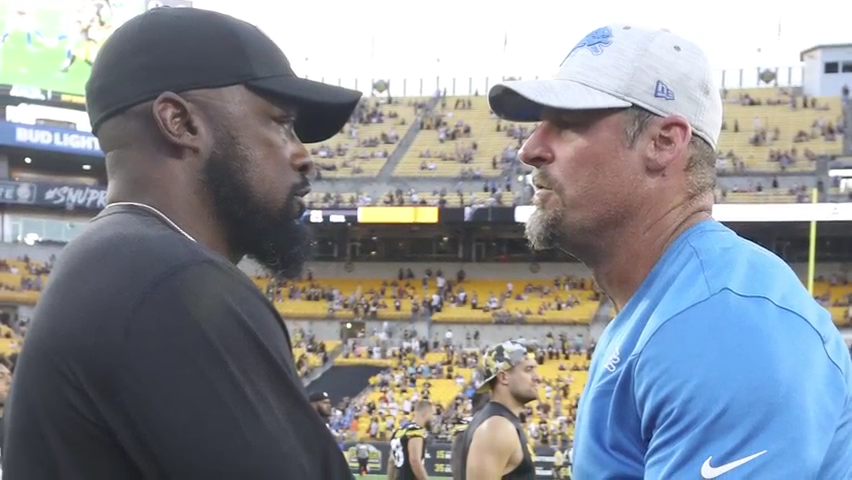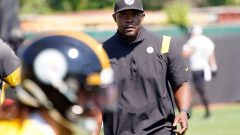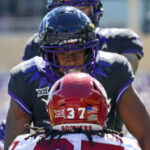Former NFL coach Terry Robiskie lauds Flores, but is skeptical anything will change for Black coaches

Maybe Brian Flores will go down in NFL history as the ultimate game-changer in the quest to level the playing field for Black coaches.
Flores was so disgusted by hiring practices in the NFL that he filed a class-action discrimination lawsuit against the league and four of its teams in February.
The bold move, with Flores, the former Miami Dolphins coach, later joined by Steve Wilks and Ray Horton as plaintiffs, threatens not only to force restitution but also to pull back the curtain on the process of hiring, not hiring and, of course, firing Black coaches — if it ever gets to a courtroom.
Win or lose, Flores, 41, is already viewed as a hero in the community of current and former Black coaches because he was willing to risk his career and take a stand — something others considered but never followed through with over the years.
“The lawsuit is phenomenal,” Terry Robiskie, who retired recently after decades in the NFL’s coaching ranks, told USA TODAY Sports. “My hat is off to Brian.
“Will it make a difference? I hope so. But I’m looking at Brian Flores possibly ending up like Colin Kaepernick. It’ll be an uphill battle.”
The NFL immediately dismissed Flores’ claims and is attempting to have the case settled by arbitration, which could allow Commissioner Roger Goodell to serve as arbitrator, rather than in open court. Flores named the Dolphins, New York Giants, Denver Broncos and Houston Texans in the lawsuit, while Wilks named the Arizona Cardinals and Horton the Tennessee Titans.
In court, the process of discovery and testimony of witnesses could be so illuminating, with the case including the contention the Giants had already settled on Brian Daboll as their new coach before conducting an alleged “sham interview” with Flores.
DIVERSITY IN THE NFL: The NFL coaches project
OPENINGS & BARRIERS: ‘Positional segregation’ is rampant in the NFL, leaving Black coaches stuck in the pipeline
Arbitration, on the other hand, would occur behind closed doors.
Although Goodell could appoint another arbitrator to rule on the case, Flores’ attorneys argued to the court that the Commissioner or his appointee would be tainted by bias — or in their words, create a “kangaroo court.” Remember, The New York Times reported last year Goodell was paid nearly $128 million by NFL owners in salary and bonuses over two fiscal years through 2021.
A ruling from the U.S. District Court is pending. And that, too, could be a game-changer.
At least Flores hasn’t become Kaepernick yet in one regard: He has a job in the league, albeit one he is over-qualified for as senior defensive assistant and linebackers coach for the Pittsburgh Steelers.
Time will tell whether Flores, dumped by Miami despite producing winning records in back-to-back seasons his final two campaigns with the Dolphins — a fate that occurs more often with Black coaches than their white counterparts — lands another head coaching job in the NFL.
Robiskie, 67, was recently honored with the Pro Football Hall of Fame’s “Awards of Excellence” for an NFL coaching trek that spanned decades as a position coach, a coordinator and twice as an interim coach.
But his career came with a glass ceiling. He never landed the opportunity to become a head coach, a frustration that he carried into retirement and is shared by many longtime minority coaches.
GRAPHIC NOVEL: A look at the history of Black coaches in the NFL
RANKINGS: Which NFL teams have the most diverse staff?
It’s no surprise Robiskie relates to Flores, because at one time he considered suing the NFL over what he perceived to be discriminatory practices.
During the early 2000s, Robiskie became the first dues-paying member of the Fritz Pollard Alliance (FPA), the organization that promotes and monitors equal opportunity for coaches and executives in the NFL. He remembers the impetus for the Rooney Rule, instituted by the league in 2003, flowing out of the threat of a lawsuit after attorneys Johnnie L. Cochran and Cyrus Mehri in 2001 publicly presented findings of a study titled, “Black Coaches in the National Football League: Superior Performance, Inferior Opportunities,” that underscored gross disparities affecting minority coaches.
Robiskie recalls being on a phone call with Cochran (who died in 2005) and Tony Dungy when the FPA was launched, contending, “If we’re going to file a lawsuit, I’m in.”
Black coaches didn’t take the NFL to court at that point, and Robiskie pointed to fears of sacrificing careers for the cause.
But the threat — with Cochran’s attention-grabbing presence as a force — undoubtedly was a factor that led then-NFL Commissioner Paul Tagliabue and other power brokers to engage in efforts that led to the creation of the Rooney Rule.
The rule, named for late Pittsburgh Steelers owner Dan Rooney, originally required teams interview at least one minority candidate for head coach openings. In ensuing years — while enduring much criticism — the rule expanded to include other roles, including general manager and coordinator posts.
Yet, USA TODAY Sports’ examination of NFL coaching demographics revealed the 314 non-white on-field coaches this season is believed to be the highest amount in league history (with 43% of the 722 total coaches identifying as minorities). There are just three Black head coaches among the six minority head coaches in a league where roughly 70% of the players are Black.
When the Rooney Rule was established, there were also just three Black head coaches. That comparison and the ebb and flow of hiring patterns over the years fuels criticism.
‘DIDN’T LOOK THE PART’: The reasons Black coaches don’t get NFL head coa





